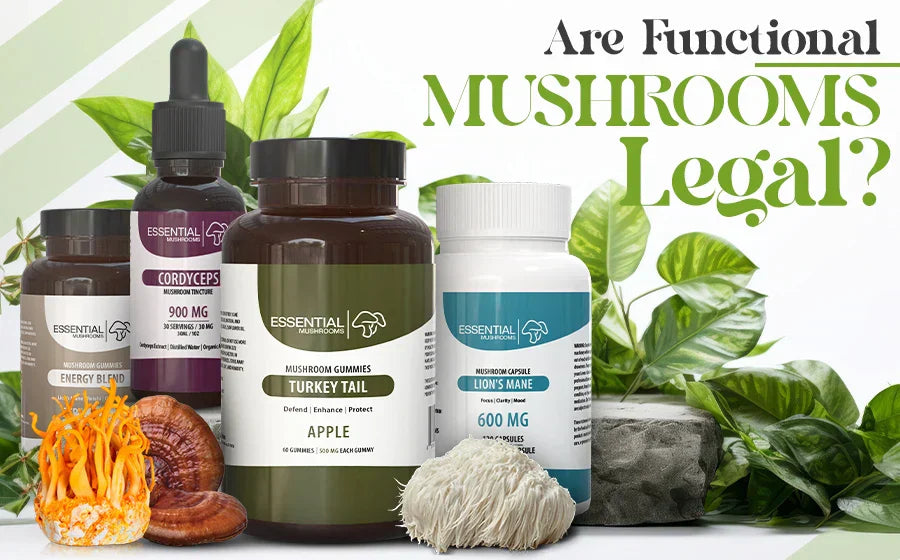It has only been a few years since functional mushrooms gained widespread popularity, but they have existed since before the concept of science, used worldwide culturally, recreationally, and therapeutically. However, their rising popularity makes room for legality, as even though this group of fungi boasts potential therapeutic properties, they haven’t been cleared by federal regulatory agencies.
Even if you were to buy mushrooms online, it would be best to understand the regulations surrounding them for compliance and prevention of legal issues. We have you covered with this blog, as it walks you through the various aspects of functional mushroom regulations, including their definition, legal status, and scientific backing.
What are Functional Mushrooms?
Functional mushrooms are a collection of fungi species that potentially have many wellness benefits transcending general nutrition. Particularly in Asian countries, they have seen extensive use in traditional medicines.
Known by different names—adaptogenic, medicinal, or functional mushrooms—functional mushrooms come loaded with bioactive compounds like polysaccharides and beta-glucans, and both compounds are likely the fuel behind the fungi’s potential health benefits.
Once used as a simple culinary ingredient, they are available today in various forms, such as powders, capsules, tinctures, and gummies.
What are the Different Types of Functional Mushrooms
Functional mushrooms are diverse. It isn’t one fungus that is extraordinary; there are several of them, and each comes with unique properties. Here are some of the most commonly used with their potential health benefits:
● Chaga: Rich in antioxidants
● Reishi: May clear mental fog and support the immune system
● Lion’s Mane: Has the potential to boost cognitive function and nerve regeneration
● Cordyceps: Believed to provide enhanced energy and endurance
● Turkey Tail: May be beneficial for gut health support
What is the Legal Status of Functional Mushrooms?
Federal Status: Functional mushrooms are generally considered dietary supplements, and the Food and Drug Administration (FDA) regulates dietary supplements under the Dietary Supplement Health and Education Act (DSHEA) of 1994, according to which they are not subject to FDA approval before marketing.
Functional mushrooms became popular for their potential to be part of our daily wellness regimen. They are said to benefit our body and mind, which resulted in the market growing exponentially, encouraging regulatory departments to monitor their efficacy and safety closely.
State Laws: Things may seem to be in the clear on a federal level, but state laws can vary, with some states having strict regulations on the cultivation, sale, and use of certain mushrooms. State governments are integral in overseeing the production and distribution of medicinal mushrooms within jurisdictions. With this method, they can address unique concerns and tweak the rules based on the changing scientific and industrial developments.
The Truth of Functional Mushrooms
They are called medicinal mushrooms for a reason, even though there may not be sufficient scientific evidence to prove the health claims made by users. These mushrooms have been called nature’s powerhouses by many.
Traditional Chinese and Indian Ayurvedic medicines have used mushrooms for centuries for their bioactive compounds, which have been associated with various health benefits. As research continues, the mushroom market continues to grow. Let’s look at what potential benefits they bring to the plate:
● Immune system support, something Reishi is predominantly used for
● Improved cognitive function and brain health using focus mushrooms Lion’s Mane
● Inflammation and oxidative stress reduction with Chaga mushrooms
● Energy boost and athletic enhancement with Cordyceps (performance mushrooms)
● Better gut health and digestive support using Turkey Tail mushrooms
Beta-glucans are one of the primary bioactive compounds in these mushrooms. Beta-glucans are believed to have immune-regulating effects. They interact with immune cells in the body, empowering you with enhanced immune response and overall immune system support.
Also, mushrooms like Lion’s Mane have earned a name for their potential neuroprotective properties, and research suggests they may support brain health and growth factors.
How to Navigate the Legal Landscape of Functional Mushrooms?
The first step to staying within the legal boundaries is to buy functional mushrooms from a reputable source, online or offline. You should also ensure the products have been verified by a third-party laboratory for purity and safety. Additionally, run through customer reviews about the brand and product you choose.
At Essential Mushrooms, you get assured quality. If you want to purchase mushrooms online, visit our online shrooms store. We prioritize safe cultivation to avoid chemicals and prepare high-quality functional mushroom supplements to provide users with the best.
Understanding the regulations is crucial to navigating the growing mushroom market and avoiding any legal complications. Since state laws can vary, you must research beforehand. We hope our guide helped you get a better understanding of the legal landscape so you can make informed decisions.
Also Read: Maitake Mushroom Vs. Shiitake
- View: 86
- Categories: News

